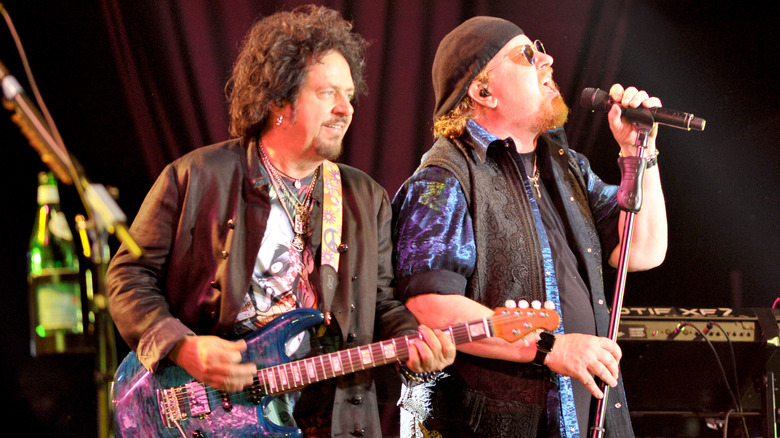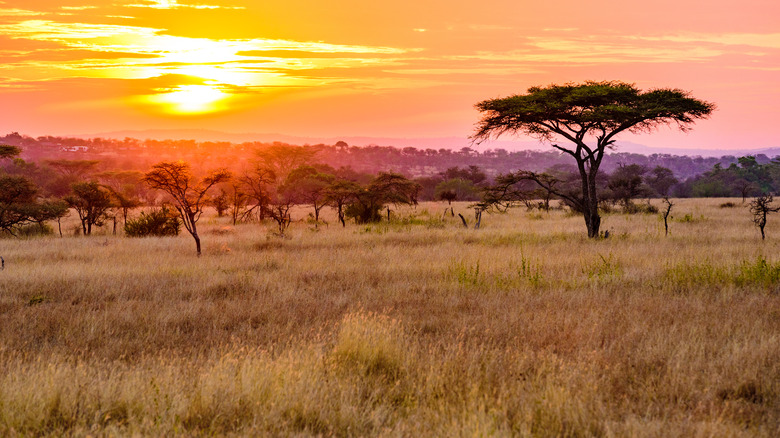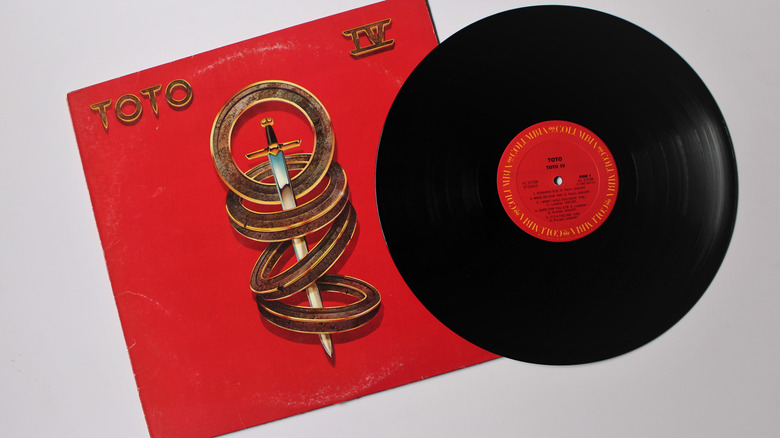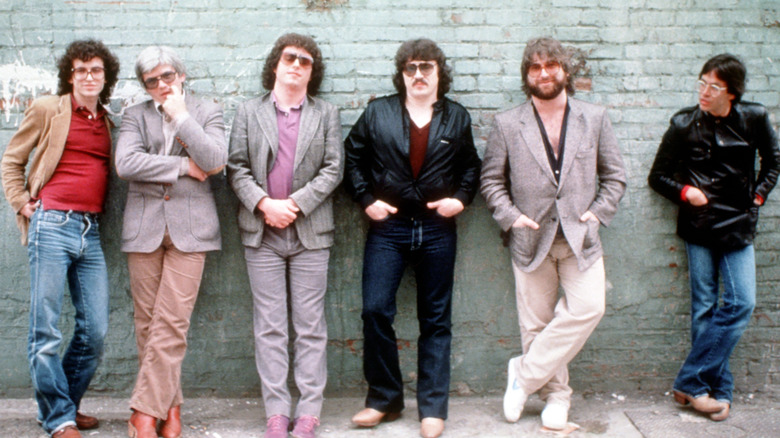The Real Backstory Behind Toto's Africa
After more than three years of failing to top the Billboard Hot 100 success of "Hold the Line," Toto became certified hitmakers in 1982 with their aptly-titled fourth album, "Toto IV," and its carrier single, "Rosanna," which went all the way to No. 2 on the singles charts. But it was another single from the album that most music fans young and old alike undeniably recognize to this day, and that song is none other than "Africa," which spent one week on top of the Hot 100 in February 1983. We bet you're singing the song's chorus in your head as you're reading these sentences.
There's no doubt that "Africa" has since gone on to become one of the most definitive songs of the 1980s and a true mainstay of modern pop culture. You may have heard it playing on "Stranger Things" or "South Park," you may have seen one of the countless memes that reference the song and its lyrics, and you may have heard Weezer's extremely faithful cover of the song, which, as you may have guessed, became possible thanks to the power of social media (via Cleveland Magazine). But how did "Africa" come about, and how did it reach mega-hit status despite deviating from Toto's usual formula?
Africa is a love song to the continent, not to a woman
Although the title of the song is "Africa," the multiple mentions of a "she" in the lyrics could make one think that the tune is about a woman who's supposed to be meeting the singer somewhere in the continent. However, the "she" in "hurry, boy, she's waiting there for you" (among other lyrics) does not pertain to anyone in particular — it actually refers to the continent of Africa.
Speaking to Grantland in 2015, Toto keyboardist David Paich opened up on what inspired him to write what would turn out to be the band's most iconic hit. "I would see UNICEF commercials on TV, way back in the day, and I was a big reader of National Geographic," he explained. "I've just always kind of been fascinated with Africa. I just kind of romanticized this story about a social worker that was over there, that falls in love and can't — is having kind of a paradox, trying to tear himself away from Africa to actually have a life."
Paich went on to talk about his time attending an all-boys Catholic school and being taught by brothers who were then unsure of whether they wanted to enter the priesthood or get married, all while traveling back and forth from the U.S. to Africa. This also informed his songwriting process, and he concluded that "Africa" was, at the end of the day, all about "a life choice mixed in with a geographical fascination."
The song took six long months to write
Sometimes, great songs are written in a matter of hours, or even minutes, with the inspiration coming all at once — or, in certain cases, under duress because your manager locked you in the kitchen until you came up with a hit. That wasn't what happened with Toto's "Africa," as David Paich told Grantland that the only things that came quickly to him were the song's melody and chorus. Talking about that especially memorable chorus, the keyboardist said that he felt an immediate need to write the lyrics down the moment he conceived them. That was the easy part. But as Paich had to "work backwards" from the chorus and create an interesting narrative for the verses with "lots of twists and turns," he ended up taking six months to complete "Africa" because he felt it was a very special song.
"I'd never tried to write anything like that before, you know?" Paich continued. "The rest of the songs were, like, 'Hold the Line' and 'Rosanna' and those kind of things, but this was a little bit deeper. We were working on the record, too, so I worked on it on and off." Due to how long it took for Paich to finish his masterpiece, "Africa" was recorded after all the other songs on "Toto IV," essentially making it the "added cut" on an otherwise complete album.
Africa nearly wasn't included on Toto IV
According to Paich, the recording sessions for "Africa" were done the "old-fashioned" way, with the "tape going around the room and the mic stands." Toto also had one high-profile guest singing background vocals on the song — Eagles bassist-singer Timothy B. Schmit. But there was a time when it wasn't even sure if "Africa" would be included on "Toto IV." Paich admitted to Grantland that his bandmates would often tell him to save the song for his solo album. This seemed to be in jest, however, as he explained that anyone who wrote a song that didn't sound like a conventional Toto track would get a joking "save that for your solo album" response from the rest of the group.
On the other hand, maybe some of those jokes were half-meant. In 2018, shortly after Weezer's version of "Africa" broke the internet for alternative rock fans and '80s nostalgists alike, Toto's Steve Porcaro and Steve Lukather admitted to KROQ that they initially found the track to be too experimental for their liking. They also recalled finding some of the lyrics "dumb," particularly the line referencing the Serengeti.
Fortunately, Paich's bandmates came around eventually and helped him see "Africa" through its completion. "The band kind of indulged me and let me start working on this track for it," he said. "This one barely made it; it just got on the end of the 'Toto IV' album. It's the one that didn't get away, you know?"
New York dance clubs helped Africa become a massive hit
"Africa" may have been the "one that didn't get away" for Toto, but the band's expectations for the track were modest at best. That's why it was a huge surprise to David Paich and his bandmates when the head of Columbia Records phoned them to let them know that "Africa" had become a hit in New York discos and dance clubs (via Grantland). For the younger readers out there, that's pretty much the early-'80s equivalent of a pop song gaining popularity through TikTok, and while it's arguably a reach to call "Africa" a dance track, that was what helped it gain momentum en route to the No. 1 spot on the Billboard Hot 100.
It was the most pleasant of surprises for Toto, and Paich said that he and his surviving bandmates remain amazed that "Africa" had such an interesting journey to the top of the charts, one that isn't as plausible to achieve in the modern music scene. "Normally, things that are kind of deep and musical and kind of off the beaten path don't make for hit records. I mean not always, for us anyway, so that was a very special record," he said.




